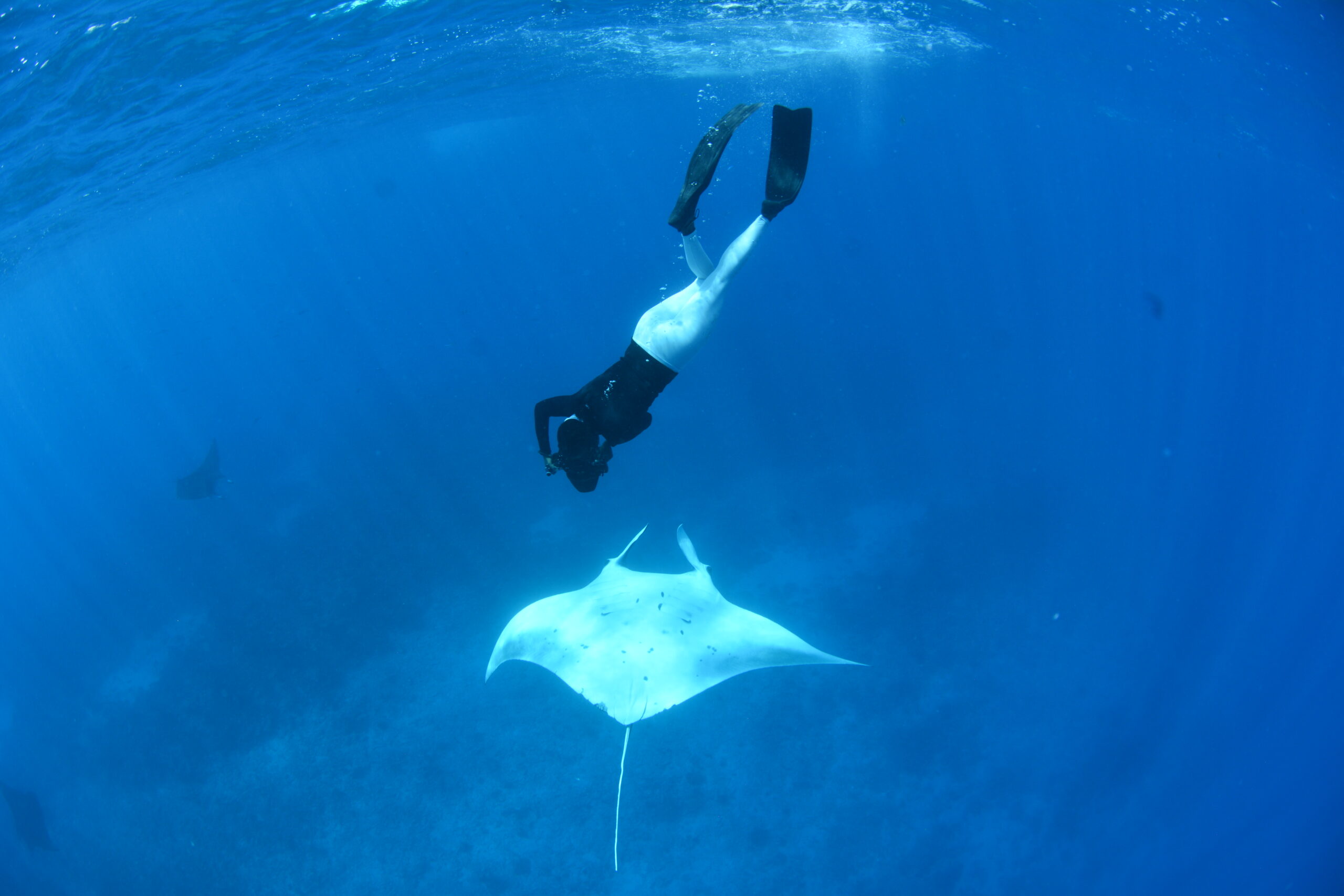PhD opportunity studying manta rays
 Activity and energetics of reef manta rays (Mobula alfredi) in contrasting seascapes
Activity and energetics of reef manta rays (Mobula alfredi) in contrasting seascapes
The Project
Reef manta rays are iconic inhabitants of coral reef ecosystems in the Indo-Pacific and have been shown to spend extended periods of time aggregating at select locations. While the habitat use patterns of reef manta rays are increasingly well documented, the mechanisms that drive the observed temporal dynamics of aggregations and habitat selection within those aggregations remain nebulous. This is primarily a result of most telemetry data providing insufficient behavioural context in the observed spatial patterns. This project seeks to address this knowledge gap by using cutting-edge, animal-attached, imaging and motion sensing tags to generate high-resolution datasets on the movement and behaviour of reef manta rays.
In collaboration with the Save Our Seas Foundation D’Arros Research Centre (SOSF-DRC) and The Manta Trust, this project will investigate the fine-scale movement patterns of reef manta rays at D’Arros Island and St Joseph atoll in Seychelles – an isolated site in the Western Indian Ocean – and the world’s largest fringing reef; Ningaloo Reef, Western Australia. Collected data will offer insights into the behavioural routines of these animals at two contrasting aggregation sites and improve our ability to both quantify the impacts of large-scale anthropogenic threats to the species and design effective strategies to conserve vulnerable populations. Fieldwork in Seychelles is generously covered by a special Save Our Seas Foundation Keystone Grant of the SOSF DRC (project title: Fine-scale activity and behaviour regimes of reef manta rays in the Anthropocene).
Prospective Students
The successful student will be based at the Centre for Sustainable Aquatic Ecosystems within the Harry Butler Institute at Murdoch University in Perth, Western Australia, and join Dr Adrian Gleiss’ research group. While the fieldwork component of this project is generously supported by the Save Our Seas Foundation, the successful student for this project will have to secure a PhD scholarship through Murdoch University. This process is highly competitive and successful students are expected to have excellent grades and/or substantial research experience. Both international and domestic scholarships are available through Murdoch University.
Please familiarise yourself with scholarship eligibility before applying (https://www.murdoch.edu.au/study/scholarships/research-scholarships).
Selection criteria
Essential criteria
· Undergraduate science degree AND Research training degree (First Class Honours, Masters or equivalent), or considerable prior research experience (3+ years)
· Quantitative skills in numerical ecology
· Swimming proficiency and confidence of being in the marine environment
Desirable criteria
· Postgraduate, MSc degree
· Research publications
· Proficiency in programming in a language common in numerical ecology e.g. R, Python, MatLab. R preferred
· Proficiency in spatial analysis and/or using Geographic Information Systems (GIS)
· Experience handling and interpreting accelerometry/biologging data
· Experience living and/or successfully performing fieldwork in remote environments
· PADI AOWD qualification or higher; minimum of 30 dives
· Freediving experience
Supervisory Team
· Dr Adrian Gleiss, Murdoch University
· Dr Mike van Keulen, Murdoch University
· Dr Robert Bullock, Research Director Save Our Seas Foundation D’Arros Research Centre (SOSF-DRC), Seychelles
· Dr Lauren Peel, Project Leader – Seychelles Manta Ray Project
· Dr Guy Stevens, Manta Trust
· Dr Mark Meekan, Australian Institute of Marine Science
Application
To apply, please send a single PDF, with your name and “Manta PhD application” in the filename and the Subject line of the email to Adrian Gleiss and Robert Bullock (a.gleiss@murdoch.edu.au & robert@saveourseas.com). The document should contain the following:
1. A personal statement of no more than 500 words why you are interested in pursuing a PhD and this project in particular.
2. A document BRIEFLY addressing each of the selection criteria.
4. A sample of academic writing (thesis, coursework or similar).
5. Your CV (including contact details for two academic referees).
All application materials must be received by 20th of September 2022. Please note that the successful candidate will have to also be successful in gaining a personal scholarship at Murdoch University, applications for which will close on the 30th of September for international students and November for domestic students. We will assist the successful student in preparing this application.
The advert can be downloaded here.

SOSF-DRC Research Officer Dillys Pouponeau with reef manta “Banshee” at D’Arros. Photo by Henriette Grimmel | © Save Our Seas Foundation
